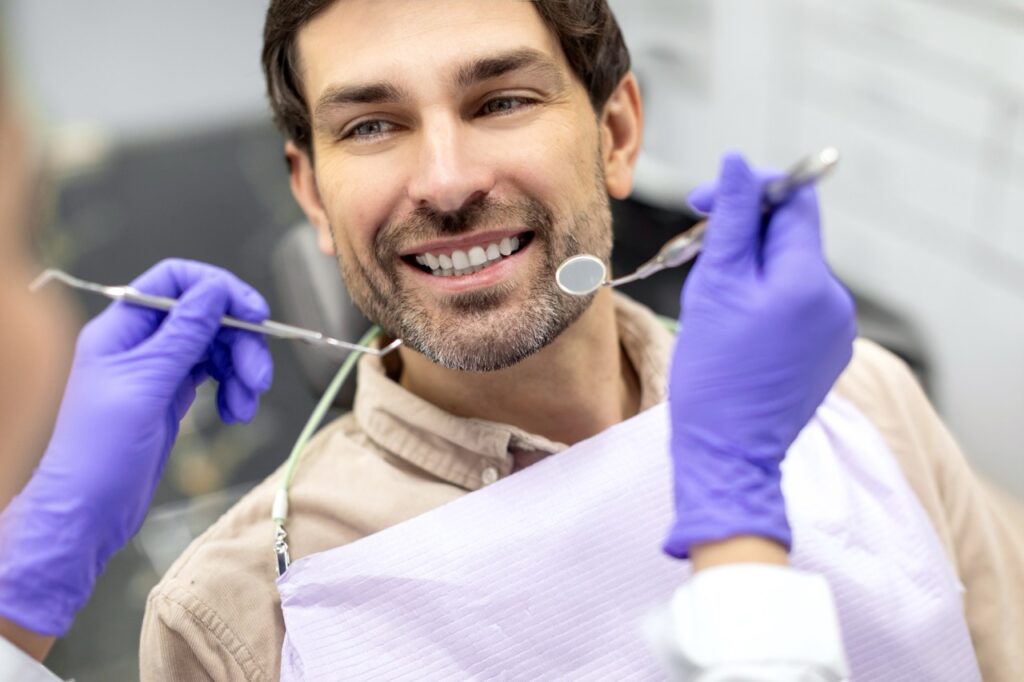Resource Library
Start Reading
Alcohol, nicotine, and illicit drugs can all threaten health. The risks aren’t restricted to those struggling with severe substance addictions. Some 48.5 million people in the U.S. aged 12 or older had a substance use disorder in the last year, according to the most recently available research from the Substance Abuse and Mental Health Services Administration.
“Most substance use disorders are mild or moderate,” says Dr. Kari Hexem, Assistant Professor of Community Oral Health at the University of Pennsylvania School of Dental Medicine, “which means [they] have an impact on your life, but your life is not completely destroyed. You can still get up in the morning, and get to work, and fulfill most of your responsibilities, but often there are subtle or even considerable impacts on your life.”
Dr. Hexem teaches clinical dentistry at Penn Dental Medicine at PHMC on Cedar. She also studies ways the dental profession can improve the quality of care for vulnerable populations, including patients living with substance use disorders.
Recently, Dr. Hexem answered several questions about the effects of substance use disorder on oral health. Watch the interview below, then read on for more information about how dental professionals like the team at Penn Dental Family Practice (PDFP) can help individuals with substance use disorders.
A substance use disorder (SUD) is “a treatable mental disorder that affects a person’s brain and behavior, leading to their inability to control their use of substances like legal or illegal drugs.” It may or may not be accompanied by other mental health disorders, such as anxiety, depression, post-traumatic stress disorder, or bipolar disorder, among others.
SUDs are “chronic yet treatable health conditions, in the same way diabetes and heart disease are treatable chronic conditions,” Dr. Hexem explains.
SUDs significantly impact oral health, manifesting in various ways depending on the types of substances used.
Common issues involving alcohol, nicotine, and drugs and oral health include:
 Dr. Hexem describes the complications of substance use as “a triple whammy” to oral health.
Dr. Hexem describes the complications of substance use as “a triple whammy” to oral health.
“The substances themselves, whether alcohol or marijuana, opiates or methamphetamines, or even cigarettes, alter the natural balance of microbes in your mouth, [making] you more susceptible to dental decay and periodontal disease. Some substances, either through their pH or other chemical characteristics, can be even more destructive.
“And so you combine the destructive aspects of the substances themselves with a tendency to have fewer self-care behaviors and more avoidance of preventive healthcare, and you can see how dental problems can grow.”
The oral health problems that can arise from SUDs can have far-reaching systemic effects.
For instance, poor oral health has been linked to cardiovascular diseases due to bacteria entering the bloodstream through inflamed gums. People with SUDs often neglect oral hygiene, exacerbating these conditions. If left untreated, infections can cause such serious medical emergencies as swollen faces, fevers, and hospital stays.
As another example, patients with broken teeth or experiencing severe dental pain can have trouble eating. This difficulty can lead to poorer nutrition and a weaker immune system. “Pain and embarrassment from bad teeth can also increase stress and depression,” Dr. Hexem adds, “and sometimes make staying in recovery harder.”
 Patients living with SUDs should prioritize routine oral hygiene and regular dental checkups. Specific steps include:
Patients living with SUDs should prioritize routine oral hygiene and regular dental checkups. Specific steps include:
 Beyond catching and treating problems early, dentists and other oral health care providers can help people with substance use disorders make a plan to fit their current circumstances.
Beyond catching and treating problems early, dentists and other oral health care providers can help people with substance use disorders make a plan to fit their current circumstances.
“We can start a conversation,” says Dr. Hexem, “asking you about your health habits to better understand where you’re at right now and support your care. We also can connect you with help, referring you to medical providers, counselors, or even recovery programs if you feel like you are ready.”
When you visit the experienced oral health professionals at PDFP, you can be confident you’ll receive the proactive, comprehensive level of care you need.
Schedule your appointment online today or call us at 215-898-PDFP (7337).